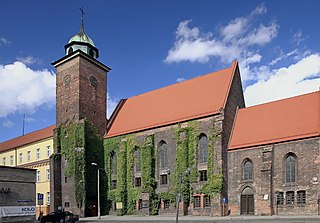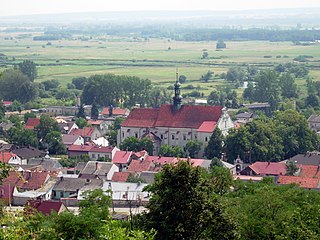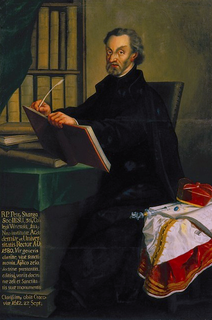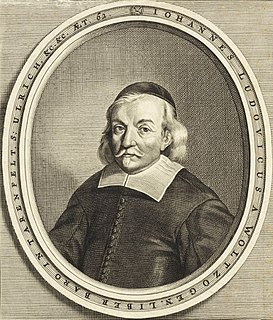Georg Schomann (Polish Jerzy Szoman) (Racibórz 1530 - Chmielnik 1591) was a Socinian (Unitarian) theologian.

Racibórz is a town in Silesian Voivodeship in southern Poland. It is the administrative seat of Racibórz County.

Chmielnik is a town in Kielce County, Świętokrzyskie Voivodeship, Poland. It has a population of 4,005 (2006), and lies in historic Lesser Poland. The name of the town is derived from hop. Chmielnik is home to a sports club Zenit, established in 1946.
Unitarianism is a Christian theological movement named for its belief that the God in Christianity is one person, as opposed to the Trinity which in many other branches of Christianity defines God as three persons in one being: the Father, Son, and Holy Spirit. Unitarian Christians, therefore, believe that Jesus was inspired by God in his moral teachings, and he is a savior, but he was not a deity or God incarnate. Unitarianism does not constitute one single Christian denomination, but rather refers to a collection of both extant and extinct Christian groups, whether historically related to each other or not, which share a common theological concept of the oneness nature of God.
In his youth, was distinguished by a deep Catholic religiosity. In the years 1552-1554 he studied at the Kraków Academy and then at Wittenberg, where he was Lutheran. He soon converted to Calvinism, and moved to Pińczów, where from 1558-1561 he taught at the local school and was a Protestant minister in churches in Pińczów and Książ. He was one of the authors of the Polish Brest Bible (1563). In Pińczów he funded and founded a library, mainly the work of the Swiss reformers, for the sum of 40 ducats. Here, too, he married.

Wittenberg, officially Lutherstadt Wittenberg, is a town in Saxony-Anhalt, Germany. Wittenberg is situated on the River Elbe, 60 kilometers (37 mi) north of Leipzig and 90 kilometers (56 mi) south-west of Berlin, and has a population of 48,501 (2008).

Pińczówpronounced [ˈpʲiɲt͡ʂuf] is a town in Poland, in Świętokrzyskie Voivodeship, about 40 km south of Kielce. It is the capital of Pińczów County. Population is 12,304 (2005). Pińczów belongs to the historic Polish province of Lesser Poland, and lies in the valley of the Nida river. The town has a station on a narrow-gauge line, called Holy Cross Mountains Rail

Książ is the largest castle in the Silesia region, located in northern Wałbrzych in Lower Silesian Voivodeship, Poland. It lies within Książ Landscape Park, a protected area located in the Wałbrzyski Foothills. The castle overlooks the gorge of the Pełcznica river and is one of the Wałbrzych's main tourist attractions.
His interest in anabaptist doctrine, led him in 1569 to travel to Hutterite communities, and he was baptized in 1572 among the Polish Brethren and in 1573 started to operate as an Arian preacher in Kraków, then Lutosławice [1] 1586-1588, and finally Chmielnik 1589-1591.
The Polish Brethren were members of the Minor Reformed Church of Poland, a Nontrinitarian Protestant church that existed in Poland from 1565 to 1658. By those on the outside, they were called "Arians" or "Socinians", but themselves preferred simply to be called "Brethren" or "Christians," and, after their expulsion from Poland, "Unitarians".
Arianism is a nontrinitarian Christological doctrine which asserts the belief that Jesus Christ is the Son of God who was begotten by God the Father at a point in time, a creature distinct from the Father and is therefore subordinate to him, but the Son is also God. Arian teachings were first attributed to Arius, a Christian presbyter in Alexandria of Egypt. The teachings of Arius and his supporters were opposed to the theological views held by Homoousian Christians, regarding the nature of the Trinity and the nature of Christ. The Arian concept of Christ is based on the belief that the Son of God did not always exist but was begotten within time by God the Father.

Kraków is the second largest and one of the oldest cities in Poland. Situated on the Vistula River in the Lesser Poland region, the city dates back to the 7th century. Kraków was the official capital of Poland until 1596 and has traditionally been one of the leading centres of Polish academic, economic, cultural and artistic life. Cited as one of Europe's most beautiful cities, its Old Town was declared a UNESCO World Heritage Site.
Schomann presented radical religious and social views in polemical writings, and in many disputes, diets and synods, including a famous debate with the Jesuit Piotr Skarga by invitation at the house of salt mine owner Prospero Provana in Kraków. The debate played host to the leading Italian Antitrinitarian exiles, including Giorgio Biandrata, Bernardino Ochino, Giovanni Alciato and Giovanni Gentile. Schomann debated also with Faustus Socinus.

Piotr Skarga was a Polish Jesuit, preacher, hagiographer, polemicist, and leading figure of the Counter-Reformation in the Polish-Lithuanian Commonwealth. Due to his oratorical gifts, he has been called "the Polish Bossuet".

Giorgio Biandrata or Blandrata, was an Italian-born Transylvanian physician and polemicist, who came of the De Biandrate family, powerful from the early part of the 13th century. He was a Unitarian.

Bernardino Ochino (1487–1564) was an Italian, who was raised a Roman Catholic and later turned to Protestantism and became a Protestant reformer.



